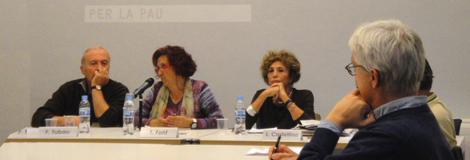International Catalan Institute for Peace ICIP
Peace movements in Spain and Italy. Experiences and perspectives.
"Peace movements in Spain and Italy"
03-05 November 2010

On the initiative of the ICIP, members of the peace movement in Italy, Spain and Catalonia met in Barcelona to share experiences, take stock of the progress of the movement and analyse the outlook for the future. The seminars, convened for the 29 and 30 October and entitled “The experiences of the peace movement in Italy and Spain,” brought together very well-known figures in European pacifism, such as the Italian journalist, writer and activist Luciana Castellina (in the photograph), a long-serving member of the Italian Communist Party, who has been the editor of the newspaper Il Manifiesto, and a member of the Italian and European parliaments. Despite the seminars taking place behind closed doors, Castellina shared her experiences during a talk at the ICIP headquarters on 28 October.
Pacifism and nuclear arms
Castellina recalled her first contacts with what she called “popular peace movements” and the lack of enthusiasm with which these movements were considered by the Communist movement, as it felt they were too neutral and therefore lacking commitment. The writer and politician said that the key lesson was the appearance of nuclear weapons, albeit some time after Hiroshima. “Not even the atomic bomb being dropped on Hiroshima made us aware of the dangers of the bomb,” she explained. “We were only thinking about how the war was over at last.” It was the beginning of the Cold War, and the potential danger of a nuclear confrontation - "bomb awareness" - that created "fear."
The other major change in the pacifist world view was a result of the decolonisation and independence of African countries, and the resulting awareness that the danger of war came from a North-South as well as an East-West confrontation. Castellina remembered the major European demonstrations by activists against nuclear weapons, within the framework of the END movement (European Nuclear Disarmament).
Pacifism and rebellion
These were followed by the World Social Forum, and the demonstrations against war in Iraq and Afghanistan. “In Italy these days, there is a commotion every time an Italian soldier dies in Afghanistan. But wars lead to deaths." Castellina described the peace movement as a movement of "rebellion against the prevailing rationality," with the conviction that security "does not involve military considerations, but instead agreement with the enemy," and war "puts us all in the same boat, and there are no rich or poor; war is not just or unjust, it is destructive."
Francesc Tubau, one of the leaders of the platform Aturem la Guerra, also participated in the talk, chaired by the director of the ICIP, Tica Font. According to Tubau, the catalyst for demonstrations by the peace movement in Spain was the campaign against NATO membership in the early 1980s.


